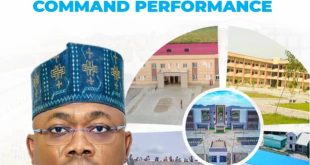By Salisu Na’inna Ɗambatta
In the quest for a systematic and rapid national development, Nigeria established some intervention agencies which design and implement specific projects to achieve particular national development goals.
One of such intervention agencies is the Border Communities Development Agency (BCDA. It came into being by its establishment Act of 2003. The Act was amended in 2006 to give the Agency sharper focus and stronger legal backing to discharge its obligations to border communities effectively and speedily. Border Communities are Nigerian settlements that are close to, or on Nigeria’s borders with neighbouring countries. Such communities are mostly located in remote areas.

In the establishment Act, the BCDA was assigned the role of “preparing comprehensive programme of action for the development of the country’s border communities.”
Prior to the establishment of the Agency, Nigerian communities adjoining our borders were undoubtedly neglected and largely excluded from mainstream national development initiatives. Many were inaccessible. Someone may not be wrong to say they were literally and truthfully forgotten communites. This was painful and sad.
Most of such communities lacked basic socio-economic infrastructure. No schools. No health centers. No clean water. The roads were bumpy and dusty, mere upgraded pathways covered by thin and uneven layers of laterite. To end this neglect of the communities, the Agency was tasked to “identify and determine in each year, such deliberate or concious infrastructural projects required for the overall development of the border communities.”
Consequently, the twin albatross of neglect and exclusion that were obvious in the border communities are being tackled by the Agency. Its management is required by law to “prepare and submit proposals on projects for the Border Communities to the President.”
To ensure an all-round positive impact on the well-being of the millions of Nigerians living in the border communities, the Agency’s leadership is empowered by the Act establishing it to “coordinate the activities of all relevant Ministries in the implementation of Federal Government policies and programmes for the development of border communities.”. Crucially, the Agency was equally given the responsibility of setting “guidelines for the implementation and monitoring of Federal government projects in the border communities.”
One important dimension to note about the scope of functions of the BCDA is that it has 21 states out of the 36 in the federation and 105 of the 774 Local Government Areas to reach and touch lives positively by providing much-needed public amenities. The 3,000 border communities are home to more than 30 million Nigerians who live in homesteads, hamlets, villages, towns and cities. They are in diverse terrains. Some of them are offshore. Many areas in Bayelsa, Rivers and Cross River states are riverine and estuarine. Parts of Kebbi, Sokoto, Katsina, Borno and Yobe are sahelian. Yet others are mountaneous or covered by thick forests.
Regardless of their location, remoteness and apparant inaccesibility, funding and other challenges, the BCDA is reaching a substantial number of these communities.
Its Executive Secretary, an airplane pilot, Captaini Junaid Abdullahi, said in an interview with Mudiaga Affe that, “Since the inception of the present (President Muhammadu Buhari’s) administration, the Federal Government has achieved an appreciable level of intervention in the communities.”
Captain Junaid Abdulahi listed some of the interventions during that interview, “Our projects are designed to address local and community-based socio-economic problems – for example lack of accessibility to educational and health facilities. We are providing blocks of classrooms, staff offices, classroom furniture, health centres, equipment, facilities, border markets, veterinary clinics and abattoirs. Other projects we are implementing are security posts, mini food processing mills (rice, garri), economic empowerment programmes, among others. These projects have increased access to affordable educational and health centres, income rise and decrease in dependence on the goodwill of our neighbouring countries by Nigerians for basic socio-economic facilities.
Salisu Na’inna Dambatta is a senior journalist.
 THESHIELD Garkuwa
THESHIELD Garkuwa




